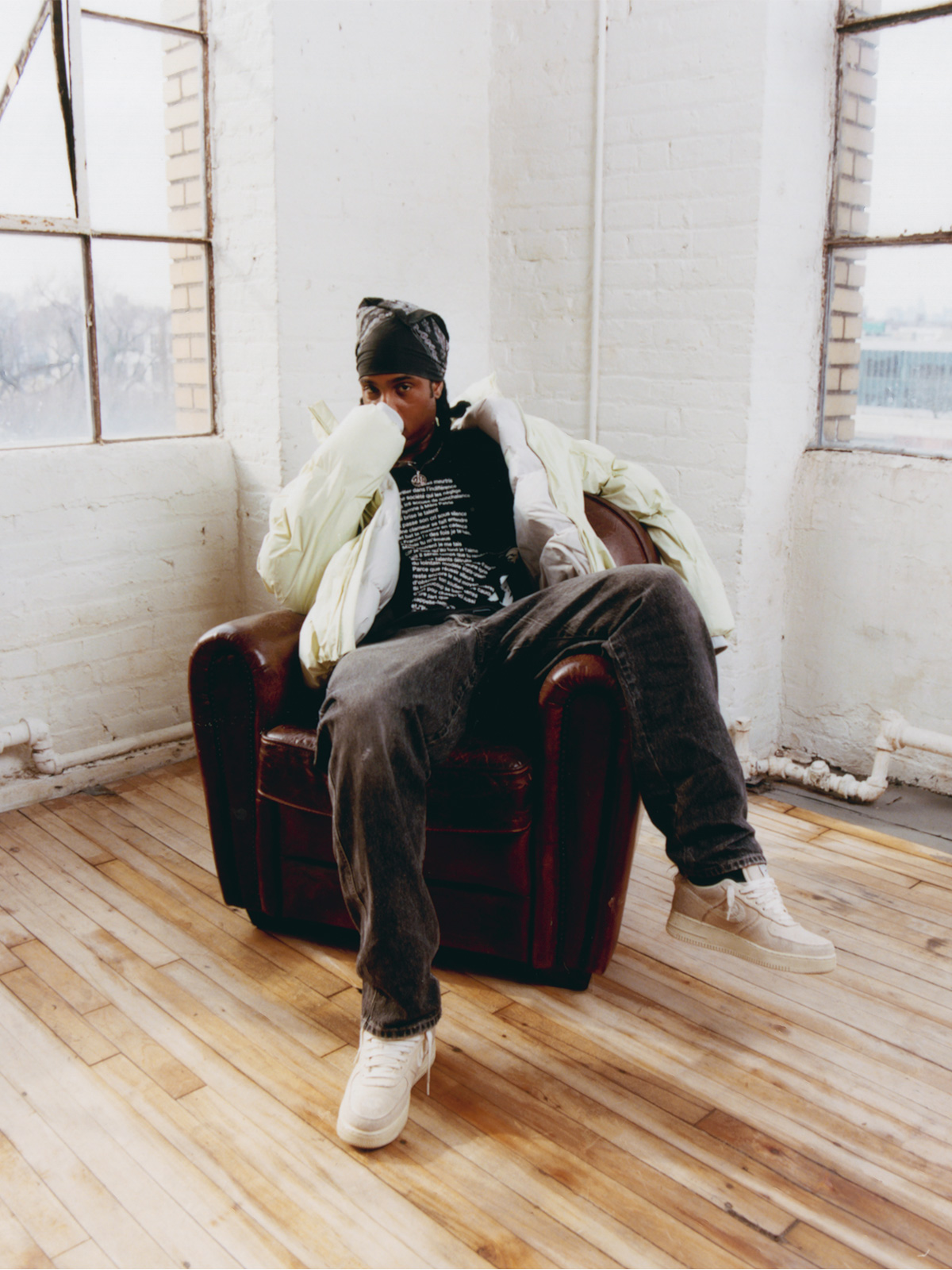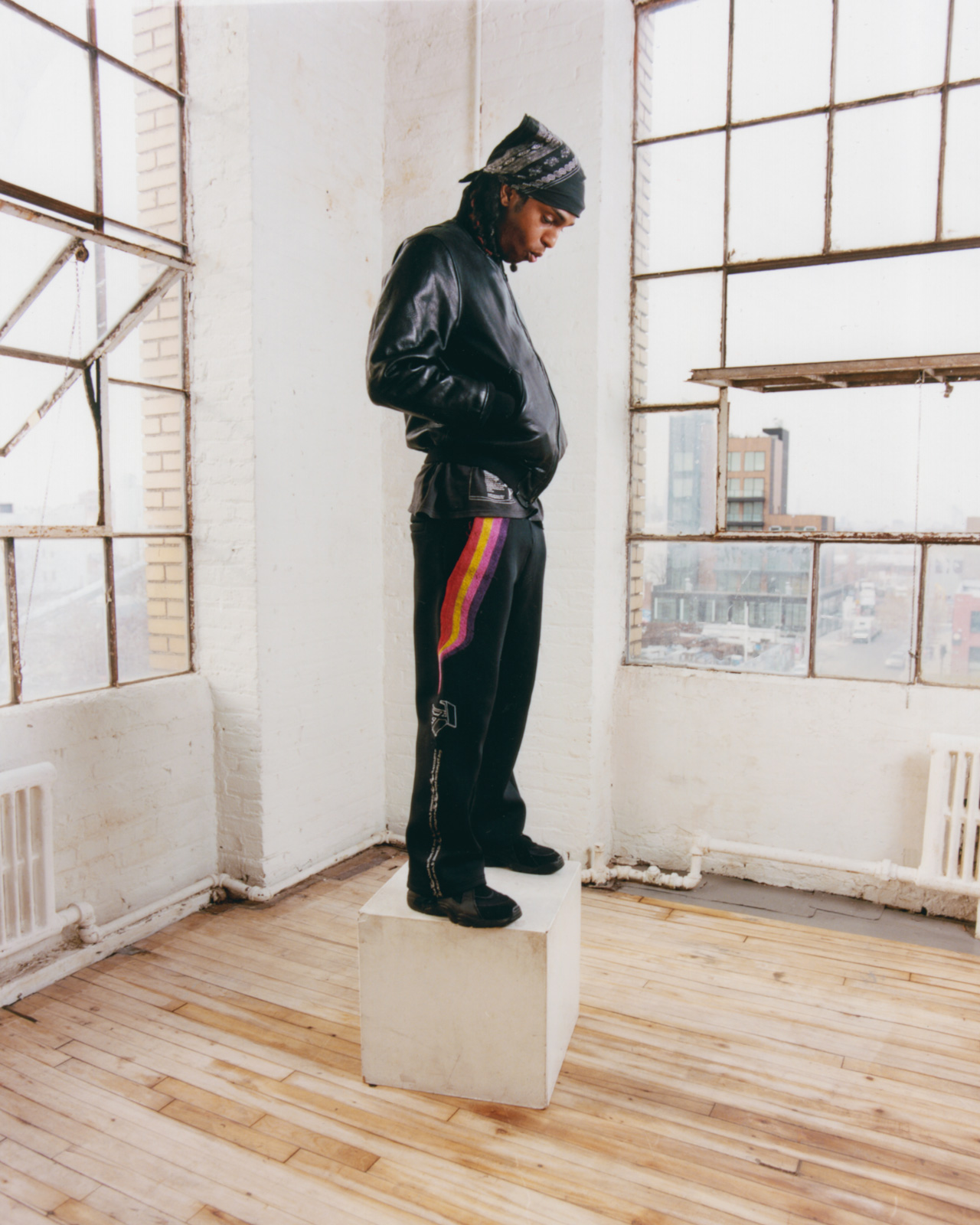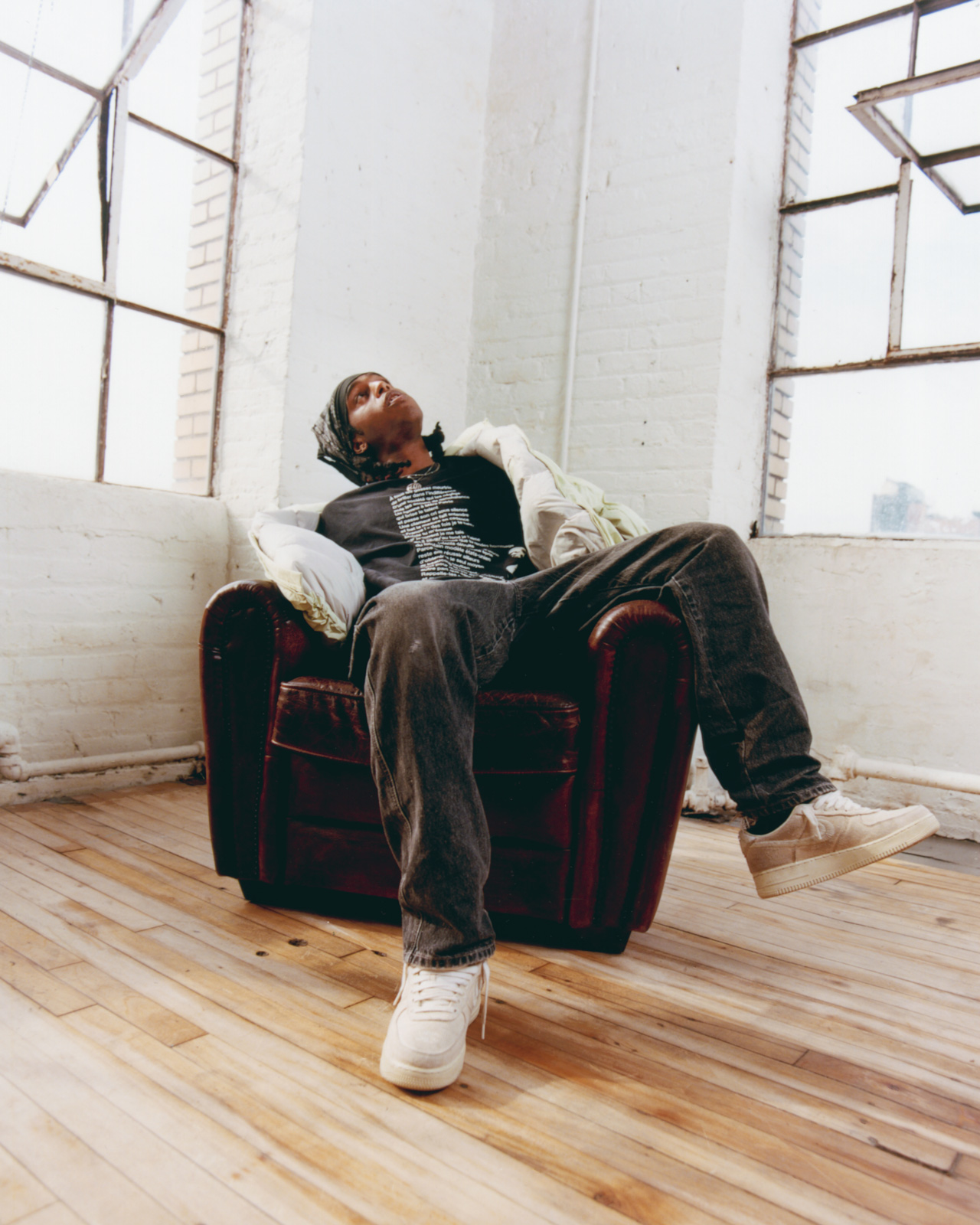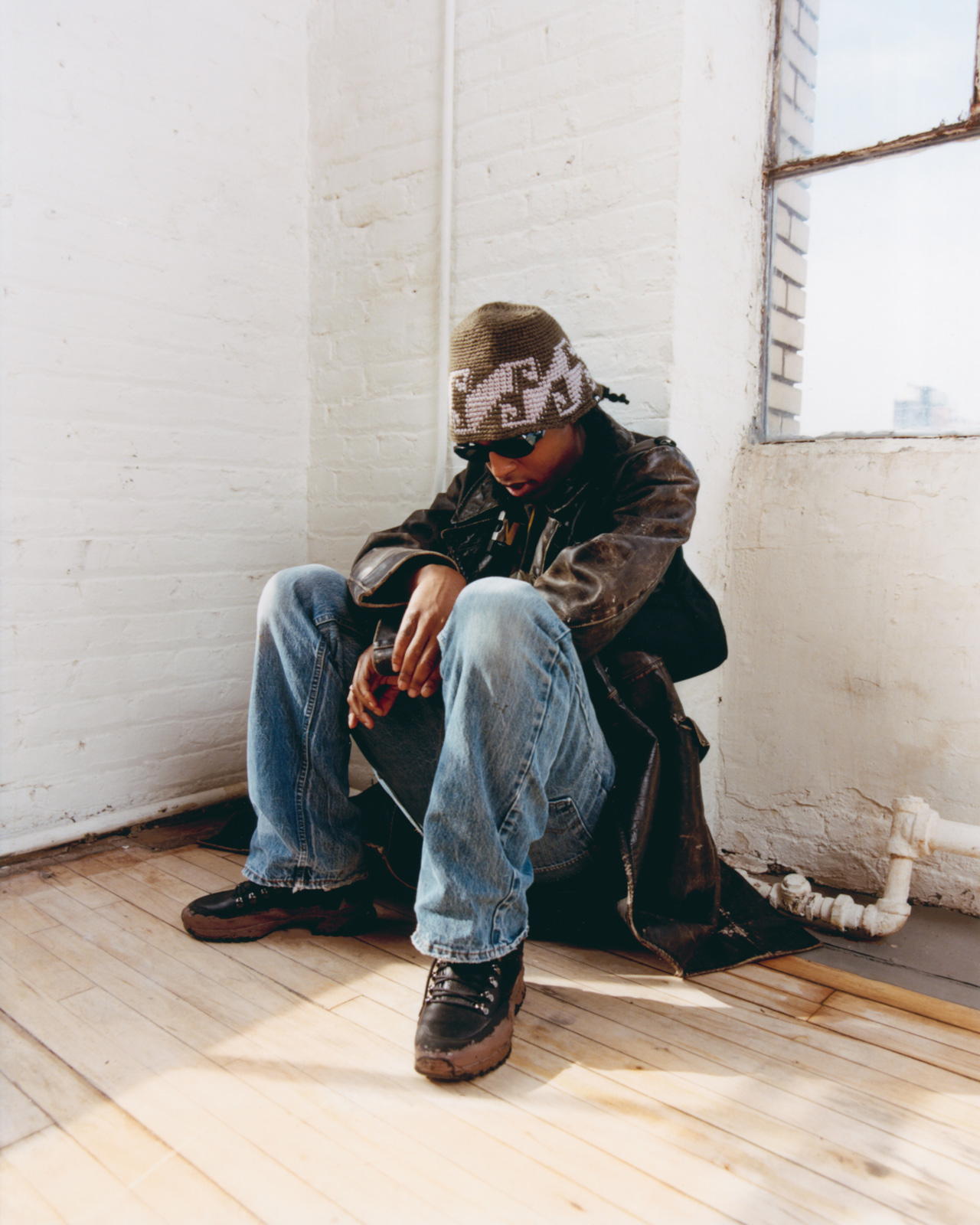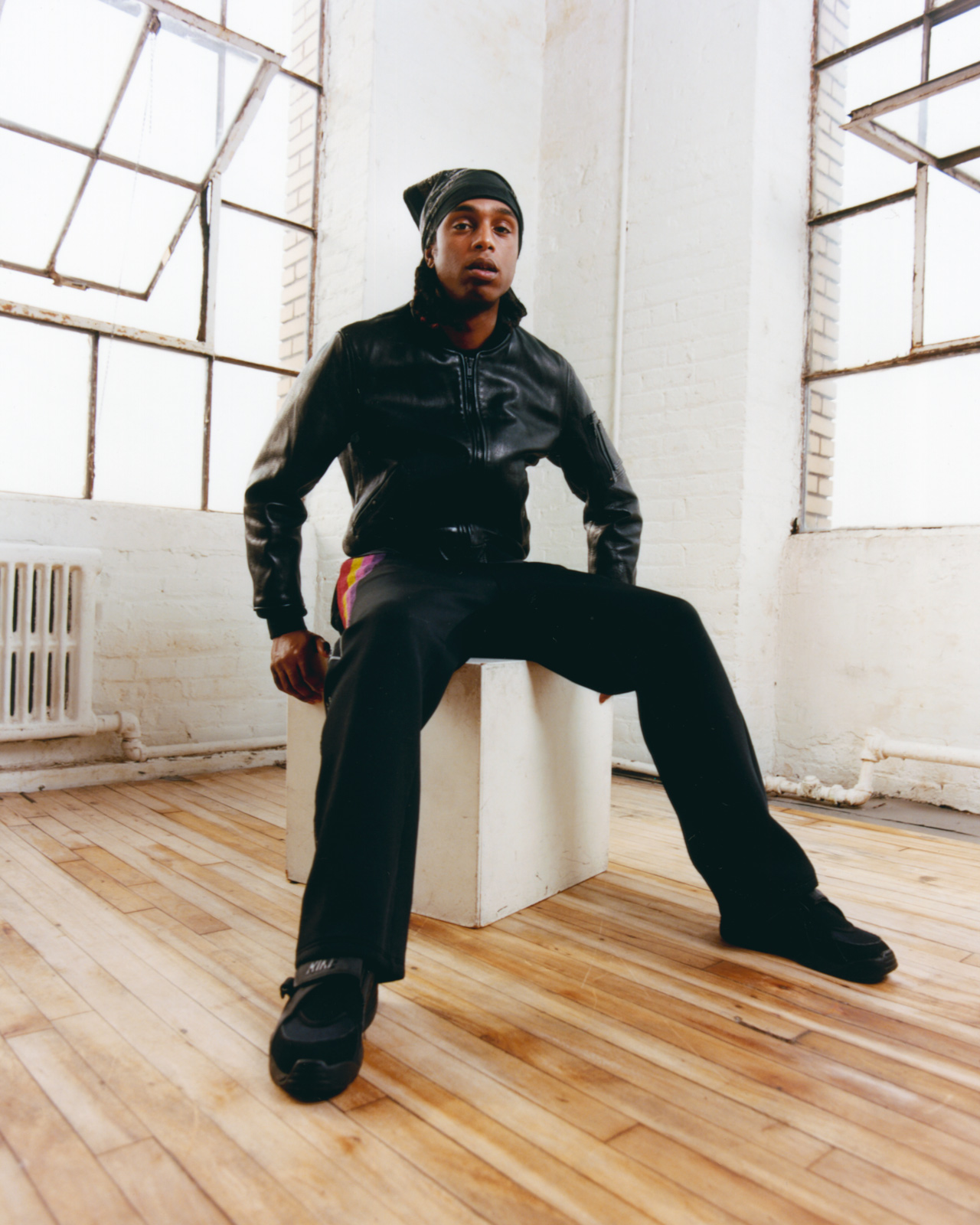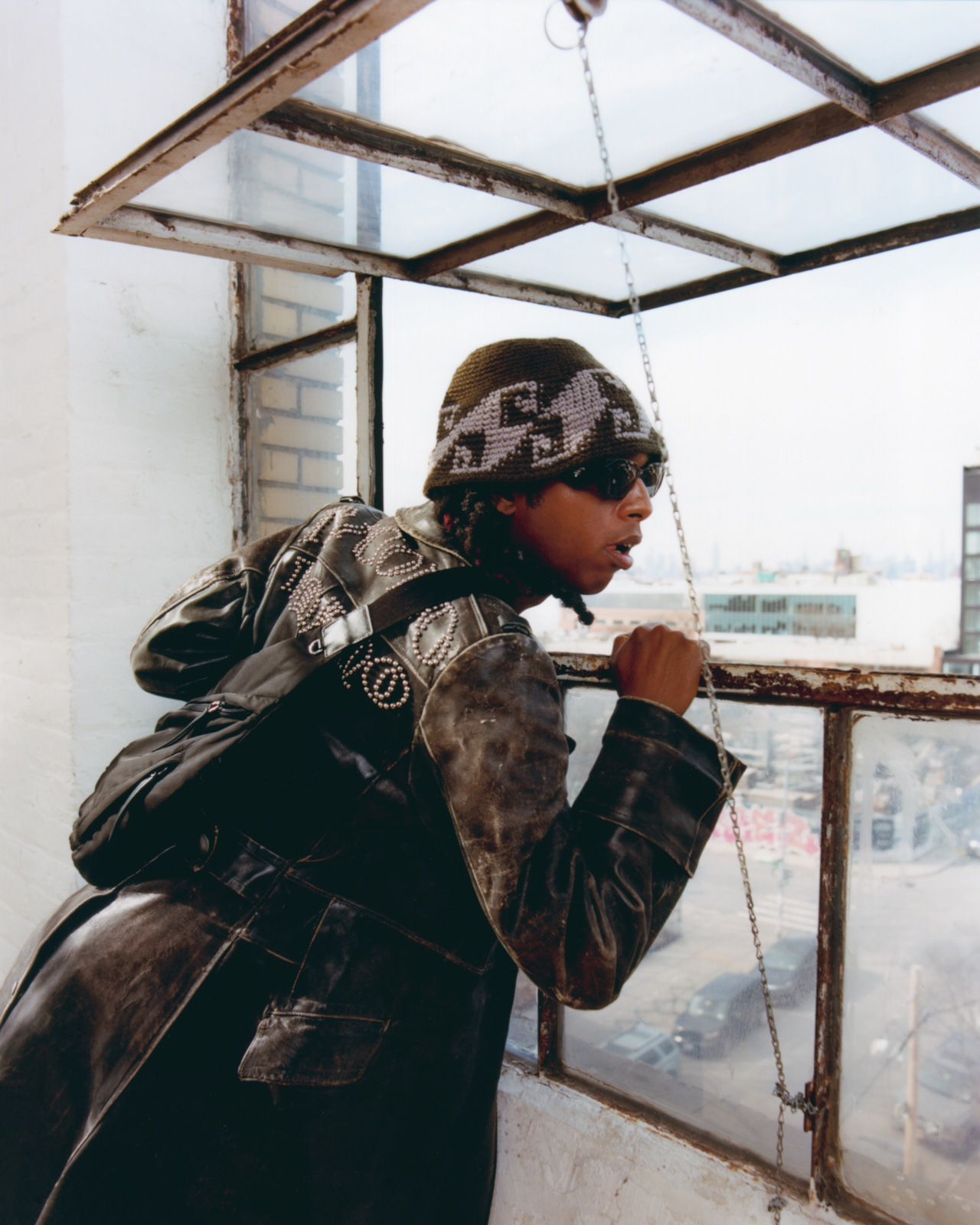The artist talks raves, street rap, following his instincts, and his latest album ‘Nobody’s Home’
Bakar’s just gotten home from rehearsals with his band, which ran half an hour over; now he’s pacing back and forth in his London apartment. A few minutes earlier, he answered the phone from the backseat of the car—“I have shitty service”—and asked if he could call back in a few. He’s been preparing to tour for his latest record, Nobody’s Home, and it’s been crazy busy. But he’s looking forward to performing again, after a long, COVID-induced hiatus. “I’m excited to be back on the road, man,” he says. “We haven’t been able to do it for so long, we’re just excited to be able to put on shows.”
This album has been a long time coming. Bakar started writing for it in 2019, two years after releasing his first single, “Big Dreams,” independently. Prior to that, he was posting to SoundCloud under an anonymous username—uploading vocals set to patchwork tracks, composed of samples from King Krule and Bombay Bicycle Club. Listening to Bakar’s work, it’s surprising that he has no formal musical training. He can do any genre, from punk to rock to rap to indie, with a keen ear for a good beat and a stuck-in-your-head melody. The artist calls himself an instinctive writer; that goes for the notes and the lyrics. Bakar’s words are loose and raw, sincere and simple in both delivery and in meaning. “Melanin bias, Jesus Christ, I’m iron-made / Darkest shade while she cleans my braids,” he intones in “The Mission.” “All I want’s my kids to have some nepotism,” the chorus carries on.
Between his breakout album Badkid and today, Bakar released Will You Be My Yellow?, an EP best-known for “Hell N Back.” The track took off, steadily climbing the charts and sticking there: “It bought me some time, basically, to figure out the record,” the artist says. He seems optimistic that he’ll have another hit, and it’s hard to disagree. Bakar has all the makings of a star—the right blend of London cool, offbeat style, boyish charm, and pure talent. You get the sense that he has big things ahead, if he keeps following his nose.
“We’re basically in the future. This is what it looks like. I am the futuristic immigrant. It’s me and my friends, and anyone else that feels like that.”
Morgan Becker: I heard that you were introduced to music through older friends, who happened to be rappers and producers. Could you tell me about that time in your life?
Abubakar Baker Shariff-Far: I was just figuring stuff out. Most of my friends were at university; I didn’t go to university, I left school when I was, like, 16. I would just chill with older people—people that didn’t have school, or they were in their gap years, stuff like that. Where I’m from, there’s always loads of musicians. Not, like, on some BRIT School shit. Just people trying to have fun and figure stuff out. I always gravitated toward those kinds of people, I figure. It’s a hindsight thing; in the moment of it, I actually didn’t think about it. I just super gravitated toward these people who were doing cool, creative things.
Morgan: What kind of music did you listen to growing up in London?
Bakar: It was mostly rap and grime, to be honest with you. That’s growing up-growing up. My mum was playing R&B and the Qur’an [laughs]. My older cousins would play garage and American rap. We got a little bit older, and then grime happened in a big way. In our secondary school days—I want to say age 12 to 15 or 16—it’s just grime. London was a grime place.
Then it started becoming a road-rappy thing; street rap became a thing. I kind of tuned out around that time, started discovering Madlib and all this stuff. I went down a completely different rabbithole. Whoever followed me down that rabbithole was on the [same] path—they ended up being like-minded people. Around that same time, I got into tastemaker-y, backpack-y hip-hop, and started listening to bands. Stuff like [Red Hot] Chili Peppers, Bloc Party. And bass music, too. Drum and bass stuff, that was a big part of my life. The first clubs we could ever get into, when I was 16, 17 years old, were drum and bass raves. So we’d go, mainly for the experience. I don’t listen to it now, but I can still appreciate it. They were the easiest clubs to sneak into.
Morgan: Was it for the music, or were you just trying to party?
Bakar: I can’t speak for everyone, but for me, I just wanted to be up until 7 a.m. The music was definitely important. Dubstep was starting to happen around that time—but, like, dubstep as we knew, and not what it became.
Like I said, we’d never been to clubs, really. So to go into your first club experience—to go to these big places like fabric in London, which is just a dynasty of dance music, probably four or five rooms, humongous… And another place called Matter, where people like Annie Mac would have huge raves. For those to be our first experiences, we were just like, Woah. We got up to that for a year or so. We went from that to way more niche, tastemaker-y, future dubstep raves that were way smaller and way more snobby [laughs].
Morgan: Do you still go out a lot?
Bakar: Not really. I’m out though, if I can be out. Do I go to raves and parties, to actually just take in music? No. It’s been sad, but I also think it’s just the state of things.
A friend of mine, he had posted a flier [from a DJ set] that past weekend on a Monday. He was like, ‘Nah, we gotta post the fliers after [the event] now.’ Almost, like, so that it’s tangible. This shit is so few and far between: a good DJ set and a good party, [a crowd] that’s just there for the music. You almost have to savor it now. You gotta post the flier after the party, like a postcard.
Morgan: What’s the concept behind the title of your latest record, Nobody’s Home?
Bakar: Nobody’s Home, as in, ‘Whose home is this?’ You know what I’m saying? Like, ‘Whose land is this? It’s not mine.’ On top of that, it’s like, ‘Nobody’s home upstairs.’ Being vacant in your thoughts, and feeling quite numb. It’s kind of a double entendre between [those two concepts].
The first question is mainly about identity. It’s asking the questions, ‘Where am I from? How did I get here? How did the people [from before me] get here?’ I’m asking questions like, ‘What do the immigrants of the future look like?’ But then also being like, ‘Actually, we are the immigrants of the future.’ Like, there are first-generation immigrants that just got here. My mom had me a year after getting to this country. It’s 2022—we’re basically in the future. This is what it looks like. I am the futuristic immigrant. It’s me and my friends, and anyone else that feels like that.
Morgan: Have you been thinking about these concepts for a long time?
Bakar: I think it was a recent inspiration. But deep down, I probably knew that I was gonna make this project—it was just about when. It really needed to be made. I had to get it out of my system in order to even be able to move forward.
Morgan: What are you looking forward to, going on tour?
Bakar: Being able to play these songs, of course. It’s been COVID, and we haven’t really been able to be on tour. I’m just excited to see the kids that listen to my music, and have them tell me what they fuck with, and show me their energy towards the record. I’m excited to be back on the road, man. We haven’t been able to do it for so long, we’re just excited to be able to put on shows.
Morgan: How has your approach to writing changed between Badkid and Nobody’s Home?
Bakar: I wouldn’t say it’s changed too much, you know? I’m quite an instinctive writer. I write from a place of honesty. My heart is on my sleeve the whole time.
I’m very envious when I hear other writers talk about pulling from their friends’ experiences, and shit like that. I haven’t really been able to do that much. Right now, everything that I write about is so personal to me, to the point where it sometimes makes me really uncomfortable. With this album, some of the shit I’m saying is so detailed.
Morgan: What was the process of completing Nobody’s Home like?
Bakar: In terms of the actual songs on this record, I probably finished them just before summer last year. It took, like, two months to finish the mix. I couldn’t get it right, and then I had loads of little politics with my label about when it would come out. It was good to finish it, because we started in COVID; it was nice to just wrap it up.
I started this record in 2019, and then at the start of 2020, I think I just got all jumbled up. I couldn’t figure it out—I wasn’t making the songs that I wanted to make. I went and made Will You Be My Yellow? in between that period, which had ‘Ghosts’ and ‘Hell N Back’ and ‘Stop Selling Her Drugs.’ I was like, ‘Okay, I can’t figure out this record. I’m gonna go make an EP that’s completely different.’ Will You be My Yellow? started picking up—you know, that song ‘Hell N Back’ started going crazy. It bought me some time, basically, to figure out the record. A couple songs [from my first try] were really potent. They stood the test of time. When I came back to Nobody’s Home in 2020, I was ready, long story short. I was so ready—the way the world was, all the topics, Palestine, this, that.
Morgan: What was it like for you when that song took off?
Bakar: It was super gradual. It was the slowest rise to number one on Billboard’s Adult Alternative chart. But for me, it didn’t feel like that. I always knew what it was, and people around me always knew what it was. So it wasn’t a great surprise.
It still streams over a million streams every single week, I’m like, Fucking hell. Sometimes I want it to slow down. It was sick, man, it was cool. It was interesting. I wonder with my next hit, if it will feel like that—because you’re in it, you can’t really feel how big something’s getting. It’s just happening. It felt good though. I’m grateful.
Morgan: You didn’t have a cell phone until pretty recently. Would you say that it’s a priority for you to live in the moment, or to stay disconnected?
Bakar: Yeah. It’s hard though nowadays. In terms of presentness, absolutely. I always want to be as present as possible. It’s difficult, because you are always looking forward. I’m always looking forward to things that are happening four, five, six months ahead. Time just goes so quickly.
That’s the one thing I don’t enjoy about [working in music]. I think about it often. So yeah, I try to stay present, especially for that reason. The connectivity part? I’ve given up on that. I’ve given up on trying to be a nomad. I don’t know if it’s possible. I think in periods and patches, it’s possible. When I dive into my next record, which I’m basically doing now—or as soon as I get off this tour in a couple months—I probably will try to disconnect a little bit.
Morgan: Do you have any spare time nowadays? How do you fill it?
Bakar: I buy clothes, I watch TV. I’m a sofa man—if I don’t have nothing to do, I’m on my sofa. I just watched all of Top Boy in, like, two days. I’m chilling, I’m playing PlayStation. I’m with friends, I’m spending money that I shouldn’t be spending in Dover Street Market. Eating food. Just trying to do boring shit.
Family—oh my god, I didn’t say that. Trying to see family. Luckily for me, I don’t live too far from my mum, which is kind of by design. My little brother, he goes to university outside of London. There’s old friends that I don’t see as much. Yeah, just catching up with people that you don’t always get to see because you’re always on the move.
Morgan: What do you think you’d be doing now, if you hadn’t found music?
Bakar: It could have gone bad, it could have gone good. I don’t know, man. I’d either be selling drugs at a festival, or I’d have my own crazy consulting agency, or I’d be creative director for Vitamin Water or something like that [laughs]. Shit was really on a knife edge. You know what I mean? I’m just lucky this music shit worked out.
Stying by Jordan Vickors and Bakar. Make-up by Ayaka Nihei. Hair by Kazuhide Katahira. Photo Assistant Raphaël Gaultier. Styling Assistant Dunya Kobrova. Special thanks to Grailed.


